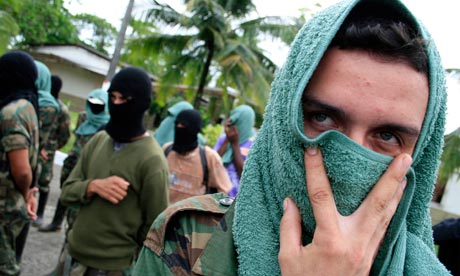 At least 26 members of the FARC rebels including a “senior commander” where killed over the weekend by the Colombian military. While the government hailed the actions as "a blow to the terrorist heart” of the guerilla, could it be possible that they are not as dangerous as they are said to be?
At least 26 members of the FARC rebels including a “senior commander” where killed over the weekend by the Colombian military. While the government hailed the actions as "a blow to the terrorist heart” of the guerilla, could it be possible that they are not as dangerous as they are said to be?In a report released last week the Bogota-based Indepaz think tank concluded that newly formed criminal groups is the “main source of violence” in Colombia. Using government data Indepaz found that these groups are estimated at over 13,000 members located in 29 of the country’s 32 departments.
Among these new criminal organizations are groups deemed as “narcoparamilitaries”, offshoots of Colombia’s AUC paramilitary group that was demobilized under previous president Alvaro Uribe. Entities with names like the Black Eagles and Rastrojos lack the political slant of the AUC yet “combine the production and exportation of cocaine with actions of extreme violence.”
The government under current president Juan Manuel Santos has reignited the military offensive against the resurgent rebels. Yet an article in The Economist recently noted that such a strategy could be shortsighted:
Mr Santos promptly vowed to “intensify the offensive” against the FARC. But such plans may require diverting resources from other security priorities, such as soaring urban crime. That is attributed primarily to fighting for control of retail drug sales and extortion rings among gangs, many of which are led by former right-wing paramilitary fighters…By attacking the government, the FARC may inadvertently be strengthening the heirs of the fighters that battled them in the 1990s.Image- The Guardian (“The 'Rastrojos' drug trafficking group.”)
Online Sources- The Guardian, CNN, La Tercera, The Economist
1 comment:
Colombia's worst enemies are not the FARC although they are despicable and should be crushed, if possible.
The biggest threats to long term security and stability in Colombia are members of ex-para groups (and any para groups that might still be active), the new gangs that have evolved from the old para system, and allies of the ex-paras/new gangs working in the FAC, the public security forces, and within the Colombian political system (i.e., the Parties, Congress, and elsewhere in the GOC).
Taken in the aggregate, these entities (and their members, of course) undermine democratic institutions in Colombia and work against the security and social and economic development of the the country. In that sense, these people are much, much more of threat to Colombia's future than the FARC ever could be.
I have the sense that Santos wants to do substantive things to address these groups and the social/development issues related to them. If I'm right (I hope I am!), I wish him the best of luck...
Post a Comment